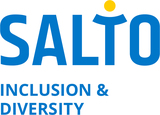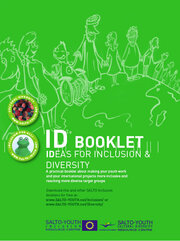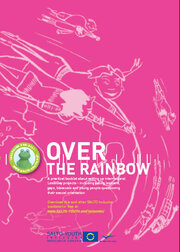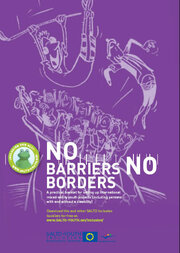SALTO Inclusion Workplan 2005-2006
- also have a look at the SALTO Inclusion statistics
Inclusion Training & Contact Making
Many professional youth workers were complaining that the SALTO course offer, even though very usefull, was very time-consuming (average length of a course was one week). Youth & inclusion workers sometimes had problems to get time off from their jobs to participate in the SALTO courses.
Therefore SALTO Inclusion, in cooperation with SALTO Cultural Diversity organised 4 shorter introductory modules on 'Inclusion and Diversity' in 2005. This way with relatively less effort (the course concept was developed anyway), we could reach more participants (by repeating the same modules several times). The ID modules were also a great opportunity to cooperate with different hosting NAs (BE-FL, CZ, MT, UK, SE).
Advanced Training for specific target groups
SALTO's offer should be complementary with that of National Agencies of the YOUTH programme. Therefore SALTO Inclusion developed a series of training course about working with specific target groups, for which on national level there would not be enough participants.
SALTO Inclusion's target group approach also stems from the realisation that 'inclusion workers' and the disadvantaged groups they work with, often have little in commone with other inclusion groups (e.g. difficult to put disabled together with ex-offenders or gay). Hence the idea to run specific courses for specific groups with specific needs.
- TC Rainbow - for youth workers working with LGBT youth (hosted by NA Romania > documented in the Over the Rainbow manual
- TC No Offence - projects with young offenders & youth in prison (hosted by NA BE-FL and follow up course by UK NA) > documented in the No Offence booklet
^^ top ^^
Bringing Stakeholders together
SALTO Bridges for Recognition 2005
Many youth workers and National Agencies strongly believe(d) in the value of the international projects and youth work that we are doing in the YOUTH programme. However, the Non-Formal Learning as done in the international projects, is not always recognised by society (e.g. employers, formal education, peers & family, etc)
To remediate this problem different initiatives in Europe saw the light to improve the recognition of Non-Formal Learning. Bridges for Recognition, organised by SALTO Inclusion, offered all these initiatives a platform to exchange and interact with different stakeholders of the recognition debate.
- Two of the concrete projects that were launched at this conference were the Youthpass and the European Youth Worker portfolio
- Browse the full Bridges for Recognition documentation here
SALTO Youth Inclusion Forum 2006
2006 was the end of the YOUTH programme (2000-2006). SALTO Inclusion was created at the start of this programme, so it was time for us to look back at the achievements and to discuss potential and challenges for the upcoming Youth in Action programme (2007-2013).
The SALTO Youth Inclusion Forum brought inclusion workers together to exchange and discuss past achievements and future challenges. It was also a place to collect feedback from grassroot inclusion workers on the (draft) European Inclusion Strategy that SALTO Inclusion had developed for the European Commission.
^^ top ^^
SALTO Inclusion Tools
SALTO Inclusion continuously added to the online Inclusion tools in the Toolbox for Youth Work and Training - it has become a standard part of the duties of the trainers working for SALTO Inclusion. This way the Toolbox is an ever growing resource for inclusion methods and inspiration.
SALTO is working for the whole of Europe, but cannot be everywhere. Therefore SALTO Inclusion develops its resources on the website to the maximum, and spreads information about good practices etc via an electronic newsletter.
SALTO Inclusion continued in 2005 & 06 with the exploitation of its courses by producing educational youth worker manuals based on the content of the courses. This led to the following publications:
- No Barriers, No Borders - setting up mixed-ability projects
- Over the Rainbow - organising international LGBT projects
- ID Booklet-IDeas and Resources for Inclusion & Diversity
- and a reprint of the very popular Going International & Use Your Hands to Move Ahead booklets
Supporting Inclusion as a priority
SALTO Inclusion is very active in its promotion efforts. The more people know about the existing resources, the easier it will be to set up inclusion projects with young people with fewer opportunities, and the more the YOUTH programme will become accessible and inclusive.
Part of the promotion and support efforts were:
- supporting the European Commission in their Inclusion work: developinig a new European Inclusion Strategy for the Youth in Action programme, analysing NAs workplans regarding inclusion,...
- highlight inclusion and SALTO's Inclusion resources in different discussion fora
- present the Inclusion work at a wide variety of NA and other meetings
- and all the other activities above
Horizontal Task: Quality Trainers in Europe
Each of the SALTO-YOUTH Resource Centers also takes on a transversal task on behalf of the whole SALTO network. SALTO Inclusion came up with the idea of the TOY database, and has since been responsible for its management and further development and promotion.
Linked to this SALTO Inclusion works on Quality Training & Trainers in Europe, joining in the discussions on quality and trainers in Europe and cooperating with different Trainer Pools in Europe.
- SALTO Inclusion developed Quality Standards for its training
- More about the TOY database here
^^ top ^^
Where did this Workplan come from?
The SALTO Inclusion Resource Centre conducted a wide stakeholder analysis and collected ideas and proposals for the Workplan 2005-2006 from the following fora:
- The recommendations of the Commission’s Working Group on Inclusion (June 04) which included inclusion workers, National Agencies and the European Commission
- Questionnaire passed to National Agencies at the Inclusion meeting at Injep, France (May 04)
- A European wide questioning regarding needs of inclusion workers via the SALTO website, via the SALTO Inclusion Newsletter and interviews (July-August 04)
- Talks with relevant stakeholders (Inclusion Officers of NAs, inclusion youth workers, Inclusion Officer of the European Commission’s Youth Unit, Internal discussions at the SALTO Inclusion RC) (July-August 04)
A Big Thank You to all who contributed !
^^ top ^^
Downloads
The following downloads are available:
- ID Booklet - IDeas for Inclusion & Diversity - 2008 update
IDeas to make your youth work and youth projects more inclusive and reach more diverse target groups. With lots of methods and tips. Based on the SALTO ID Modules 2003
- Over the Rainbow - international LesBiGay projects - 2008 update
Inspiration & advice for setting up respectful projects with young gay lesbian bisexual people. Lots of information about project management, finding partners, funding,... Based on SALTO TC Rainbow 2005
- No Barriers No Borders - international mixed-ability projects - 2008 update
How to set up international projects with young people with and without a disability. With lots of tips & tricks about partnerships, funding, working with disability,... Based on SALTO TC Enable 2003
- Bridges for Recognition - Final Conference Report
The final report of Bridges for Recognition - a conference promoting the recognition of youth work accross Europe. Find the conclusions, suggestions for action, keynote speeches, evaluation, etc
- SALTO Youth Inclusion Forum - report - 2006
Find an overview of the conclusions, expert contributions and the results of the discussions of the SALTO Youth Inclusion Forum in Antwerp (October 2006) - lots of concrete suggestions on how to work inclusively more effectively.
- Inclusion Strategy for the Youth in Action programme - 2007-2013
The European Commission developed this Inclusion Strategy in cooperation with SALTO Inclusion to make it easier for young people with fewer opportunities to participate in the YiA programme (rightclick & download to your PC)




 Bridges Staff
Bridges Staff

